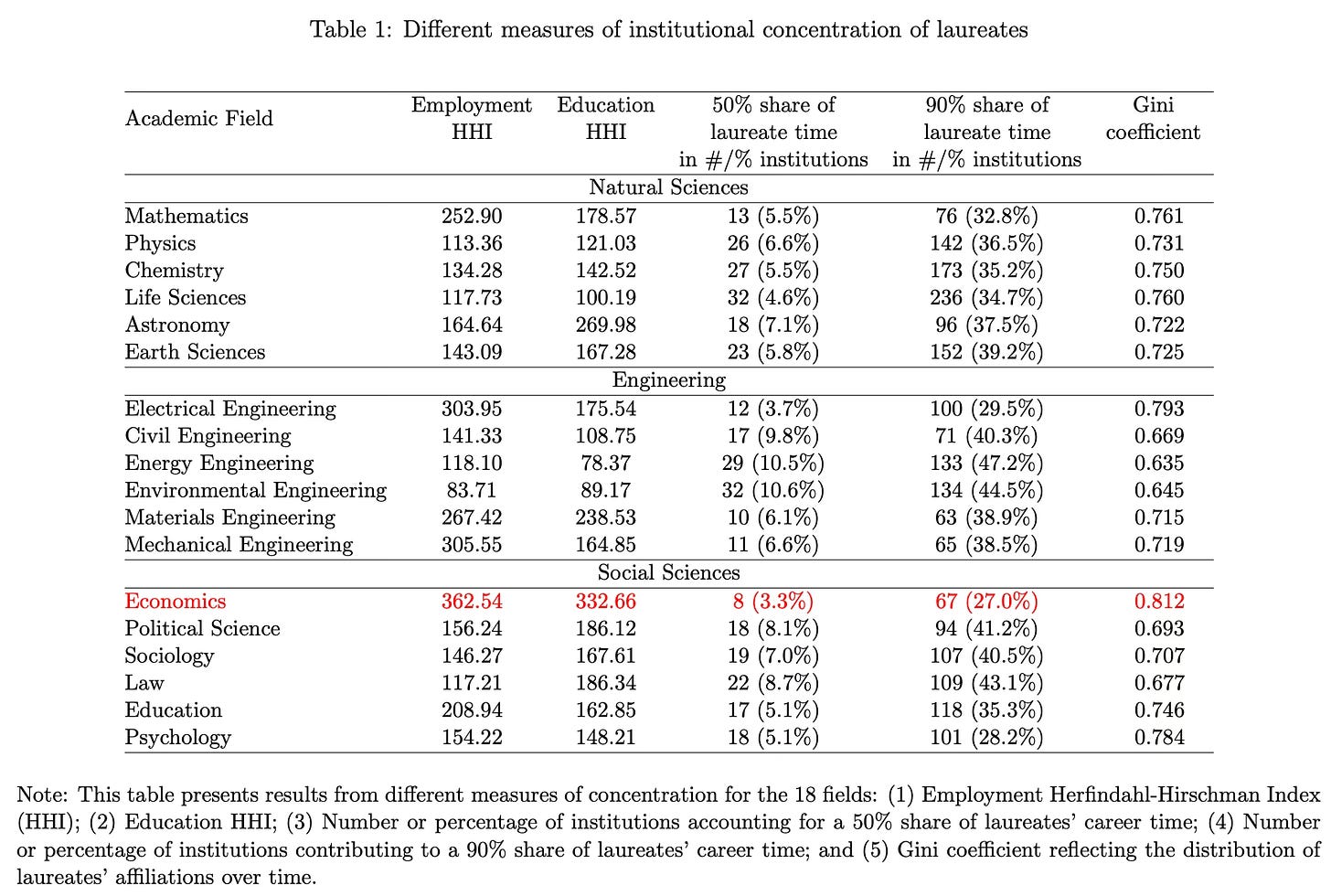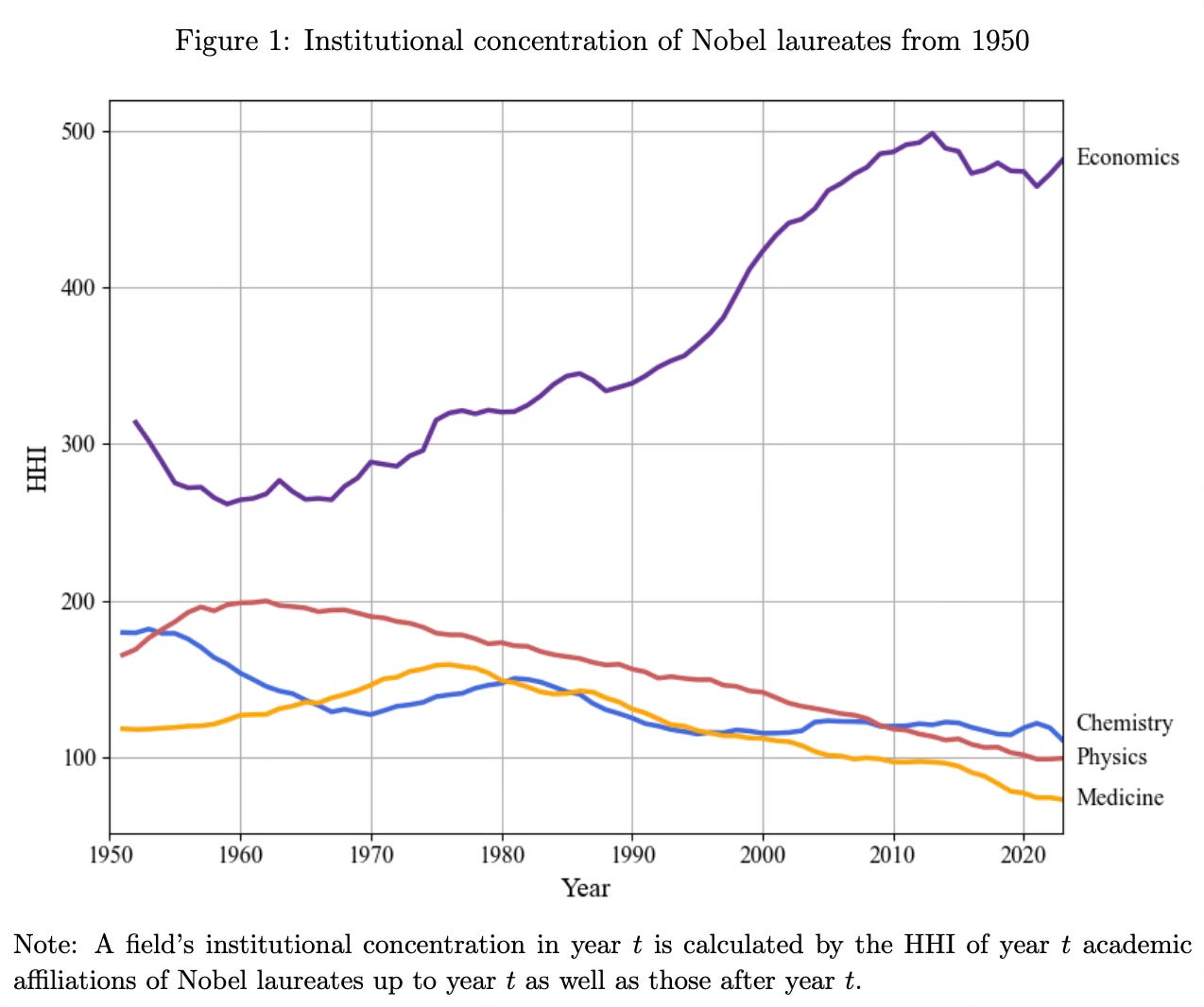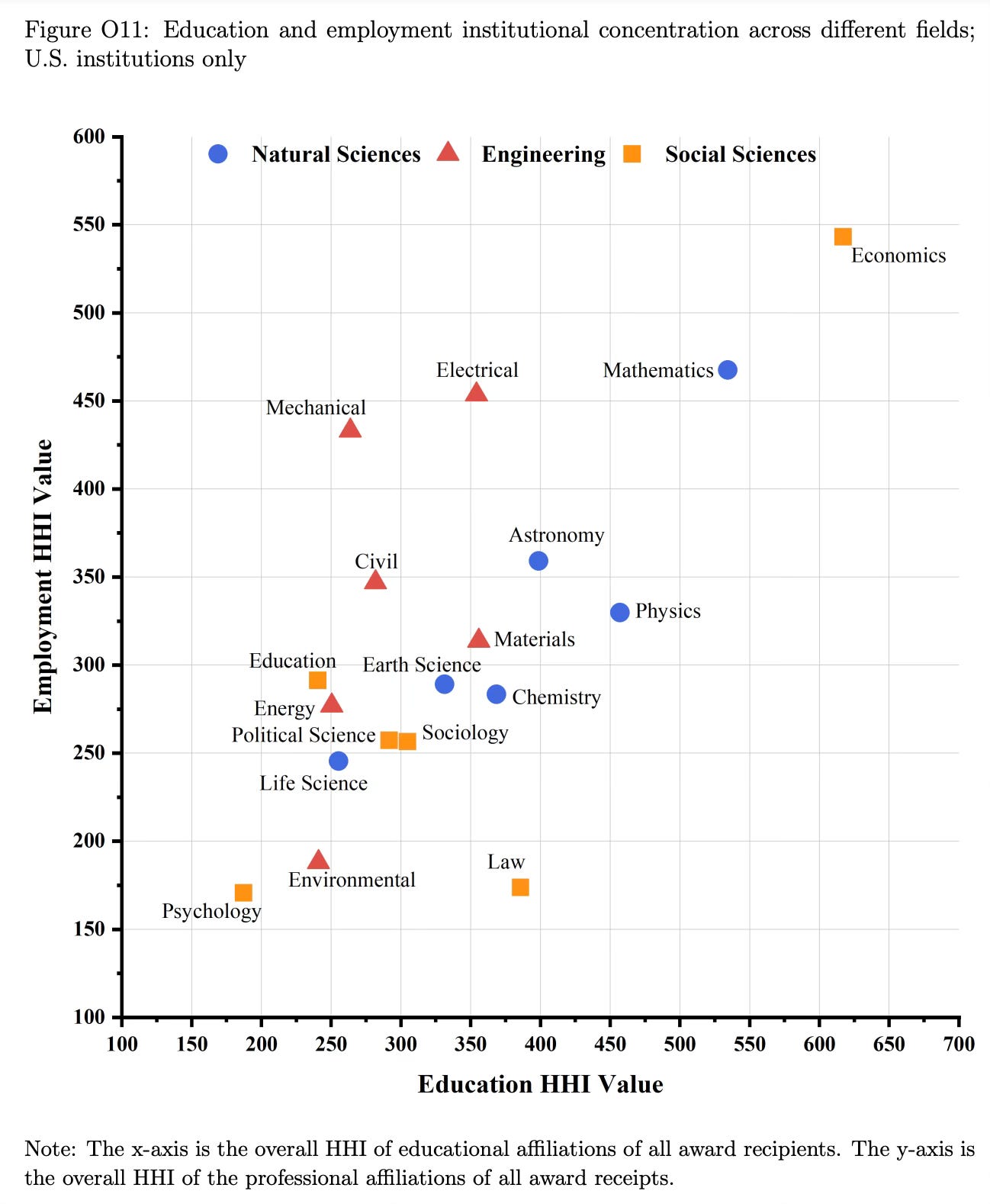While economists discuss market concentration across different market segments, an alarming level of market concentration has built up within the economics profession itself. Worse still, economics stands egregiously apart from other academic professions in this sharply rising concentration.
An FT editorial referring to the need for trustbusting in economics points to a surprisingly less discussed recent paper by two US-based and two Chinese researchers (based at Tsinghua University) that explored market concentration across different academic departments within the US. Four researchers analysed the institutional clustering over their lifetimes (from their places of study to their places of work) of nearly 6000 award-winning researchers across 170 notable awards in 18 major academic fields covering six fields in each of natural sciences, engineering, and social sciences.
All fields, except for economics, exhibit a low and decreasing concentration, which suggests a trend toward decentralized knowledge production. Conversely, economics shows a high and rising concentration. We investigate potential reasons for this anomaly, including researcher mobility, reliance on physical assets, the age of fields, the role of prestige, and the influence of the United States in shaping disciplinary norms… Remarkably, economics is identified as the most concentrated field at the 50% threshold level, with half of the laureates’ academic time spent at just 8 institutions, which account for only 3.3% of all institutions with awards… In addition, economics boasts the highest Gini coefficient of 0.812.
This Table captures the extent of concentration across the 18 academic departments.
This graphic shows that economics stands alone as a field with a high and increasing institutional concentration of Nobel Prize laureates.
Across 170 awards too, economics stands out as an egregious outlier in being the only field with a high and rising education and employment concentration.
The paper explores the reasons behind this high and rising concentration in economics in stark contrast to the opposite trend in the other 17 fields. It reiterates the importance of broad-based competition.
Addressing institutional concentration is crucial, because the formation of elite echelons in various aspects of science, from publication records to institutional ties, could potentially stifle creativity and innovation. This phenomenon, often reflected in academic rankings, may establish an incentive structure that discourages researchers from delving into and disseminating findings on vital but non-mainstream topics within their disciplines. Consequently, such a concentration could serve as a hindrance to creativity and originality.
They argue that social sciences and mathematics being theoretical in nature are not constrained by the need for large tangible equipment and facilities, and are therefore likely to have lower entry barriers. They validate this by showing that economics also has the highest mobility of faculty, with its faculty being 5.41% more prone to move compared to Civil Engineering.
It then explores the specific reasons for economics being an outlier.
Economics is distinguished by its high mobility, relative novelty, and the significant role prestige plays within the field. For each of these distinguishing features, we present supporting evidence and explore their implications for the field’s dynamics… Individuals tend to associate with those who are similar to themselves, a phenomenon known as homophily… We propose that homophily significantly contributes to the patterns observed in institutional concentration… Homophily plays a less important role in subjects with a high level of concentration, because the discipline values established reputations over personal characteristic. For example, an economist is more likely to cite an article from a leading journal such as the American Economic Review than to cite a peer’s work. This tendency reinforces an academic hierarchy, where recognition is heavily weighted towards prestigious publications and institutions… younger disciplines are likely to exhibit greater institutional concentration compared with their older counterparts… Economics as the most dynamically growing field in terms of institutional development. This reflects its relative novelty and high concentration…
Scientists with high status are more likely to attract substantial resources, including research grants and exceptional graduate students. These resources can subsequently be used to produce scientific results of higher quality… economics stands out for its emphasis on prestige compared with other subjects. Tollison and Goff discovered that within their respective fields, prominent economists receive significantly more citations than prominent physicists do… Prior research also reveals that economics has a unique and pronounced hierarchy within the discipline, which sets the subject apart from other social sciences…
In the field of economics, while book chapters contribute to scholarly discourse, journal publications are often held in higher status. Evaluators typically prioritize the prestige of the publication channel, with articles in top-tier journals receiving greater recognition… several leading economic journals edited at prestigious universities have a strong preference for in-house authors. During 2000-2003, 13.89% of articles published in the Journal of Political Economy (JPE) were by authors at its publishing home, the University of Chicago, and 15.3% and 12.8% of articles published in the Cambridge-based Quarterly Journal of Economics (QJE) were by authors affiliated with Harvard and MIT, respectively. During 2000-2016, the numbers further rose to 14.3% for Chicago affiliates in JPE, and 24.7% for Harvard affiliates and 13.9% for MIT affiliates in QJE…
Disciplines characterized by greater insularity are more frequently cited by researchers from other fields than they cite external disciplines, in contrast, fields with a strong interdisciplinary focus are more inclined to reference work from other areas than they are to be cited by them. Furthermore, fields with high interdisciplinarity and frequent collaboration across disciplines tend to exhibit lower levels of institutional concentration, as a result of the contributions of practitioners from diverse backgrounds and the differing prestige of institutions across these backgrounds… In the realm of social sciences, there is a marked asymmetry in cross-disciplinary citations, with economics as the outlier. During 2000-2009, American Political Science Review cites the top 25 economics journals more than five times more frequently than American Economic Review cites the leading 25 political science journals. This imbalance is even more pronounced in interactions between economics and sociology, with only 2.3% of citations in American Sociological Review directed toward economic literature, compared with a mere 0.3% of economists’ citations acknowledging sociological work… Focusing on citations between the top five most influential journals in each discipline, previous research has shown that 43.29% of citations of economics journals are from other disciplines; the percentage is 8.08% for political science, 12.41% for psychology, and 24.75% for sociology. Furthermore, economics, psychology, and business are identified as the top three exporters in terms of both citations and knowledge surplus…
In focusing on the comparison of economics with other social sciences, it is clear that economics stands apart based on its deep involvement with public administration, corporate strategy, and international organizations. Economists apply their knowledge across the spectrum of public policy: They are heavily represented within finance ministries, central banks, government branches, global organizations, and leading consultancy firms, and often play influential roles. In contrast, disciplines such as sociology and political science typically adopt a more contemplative and critical stance; And seldom stepping in with fixes and remedies—a reflection of both opportunity and inclination. Economics’ affinity to applied research in finance, management, and public policy fosters a nexus with both the corporate and governmental sectors.
Some thoughts:
1. The academic economics field needs to apply its own prescriptions on competition and anti-trust to address a clearly evident problem.
2. The high level of insularity and high citations of economics papers by other fields and low citations of works in other fields in economics is akin to autarky and trade surpluses among economies. Economists lose no time criticising autarky and trade surpluses while the same trends are pervasive within their own field.
3. All the other factors discussed in the paper - knowledge production, homophily, prestige etc., - all have their basis in market failures that economists research in the wider context of markets and economies. So, in general, to address the glaring hypocrisy, economists would do well to practice what they preach.
4. I have blogged here about how US-based Indian-origin academic researchers in economics can contribute to the development of India. Most of the suggestions made there are just as relevant to reducing market concentration within economics.
Their greatest possible contribution, far beyond even their substantive economics research works, would be if they could nurture institutions and academic partners in India, take sabbaticals to work in Indian colleges and universities or at least take a few classes periodically here, publish in Indian academic journals etc.
5. The most disturbing thing is that this concentration of influence within economics might be more damaging compared to other fields. Economics, being concerned with the allocation of scarce resources across competing needs, exercises an outsized influence on all political, public, and social issues.
To the extent of the concentration, the opinions on important global and national public issues like climate change mitigation, poverty alleviation, international trade and financial flows, widening inequality, international aid transfers etc., get skewed towards those held by the economists in these elite institutions. The international institutional architecture that engages on these issues is also under the tight grip of these economists and their views and theories. Worst of all public debates on these issues are enveloped by the hegemony of narratives and ideologies formulated by these economists.
6. Having recognised this problem, it would be appropriate if the field takes the lead in developing and implementing a market design that alleviates and rolls back such concentration. It would be a good example of how economists could apply their own toolkits to address a problem impacting their own discipline. For a change economists could become practitioners. The learnings from this experience could inform the field in prescribing solutions to public policy challenges of a similar nature.
7. Finally, it would be useful to keep this research going forward within economics by disaggregating the concentration within economics itself among the different sub-disciplines. Which sub-disciplines are the most concentrated, why are they so, and what could be done to mitigate it?
It could be useful to observe the extent of concentration among individual economists and their institutions in terms of their education, academic teaching and research career, choice of research co-investigators, choice of doctoral scholars advised, extent of cross-disciplinary research citations, names of publications etc.




No comments:
Post a Comment